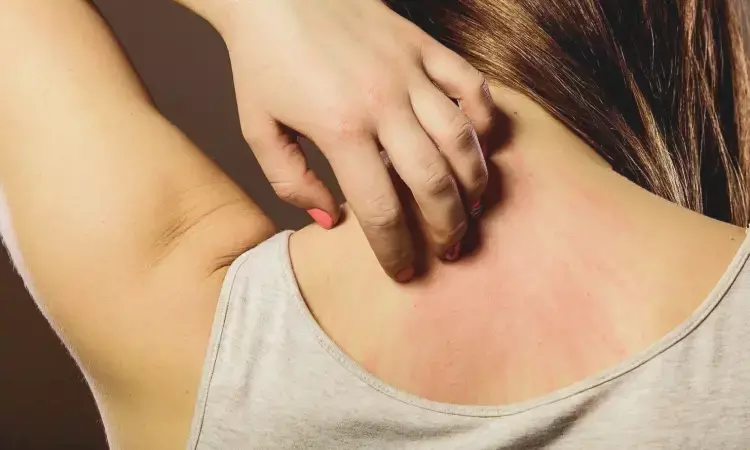- Home
- Medical news & Guidelines
- Anesthesiology
- Cardiology and CTVS
- Critical Care
- Dentistry
- Dermatology
- Diabetes and Endocrinology
- ENT
- Gastroenterology
- Medicine
- Nephrology
- Neurology
- Obstretics-Gynaecology
- Oncology
- Ophthalmology
- Orthopaedics
- Pediatrics-Neonatology
- Psychiatry
- Pulmonology
- Radiology
- Surgery
- Urology
- Laboratory Medicine
- Diet
- Nursing
- Paramedical
- Physiotherapy
- Health news
- Fact Check
- Bone Health Fact Check
- Brain Health Fact Check
- Cancer Related Fact Check
- Child Care Fact Check
- Dental and oral health fact check
- Diabetes and metabolic health fact check
- Diet and Nutrition Fact Check
- Eye and ENT Care Fact Check
- Fitness fact check
- Gut health fact check
- Heart health fact check
- Kidney health fact check
- Medical education fact check
- Men's health fact check
- Respiratory fact check
- Skin and hair care fact check
- Vaccine and Immunization fact check
- Women's health fact check
- AYUSH
- State News
- Andaman and Nicobar Islands
- Andhra Pradesh
- Arunachal Pradesh
- Assam
- Bihar
- Chandigarh
- Chattisgarh
- Dadra and Nagar Haveli
- Daman and Diu
- Delhi
- Goa
- Gujarat
- Haryana
- Himachal Pradesh
- Jammu & Kashmir
- Jharkhand
- Karnataka
- Kerala
- Ladakh
- Lakshadweep
- Madhya Pradesh
- Maharashtra
- Manipur
- Meghalaya
- Mizoram
- Nagaland
- Odisha
- Puducherry
- Punjab
- Rajasthan
- Sikkim
- Tamil Nadu
- Telangana
- Tripura
- Uttar Pradesh
- Uttrakhand
- West Bengal
- Medical Education
- Industry
Treatment with biologics may improve symptoms in subset of patients with congenital ichthyoses: Study

Researchers have found that biologics may significantly improve patients with particular subtypes of congenital ichthyoses (CI), especially those with erythrodermic presentation, such as Netherton syndrome (NS) and congenital ichthyosiform erythroderma (CIE). A new study was recently published in The British Journal of Dermatology which was conducted by Juliette and colleagues.
https://doi.org/10.1093/bjd/ljae420Congenital ichthyoses (CI) is a group of rare genetic disorders associated with chronic scaling, erythema, and pruritus. Clinically, the effects on quality of life are typically severe, and conventional therapies therefore offer only partial improvement. Recent identification of cytokine dysregulation in CI has renewed interest in repurposing biologics which target inflammatory pathways and, importantly, several case reports have been encouraging.
This retrospective observational study analyzed data from 98 patients with CI treated with biologics for at least three months. Patients were evaluated using the Investigator Global Assessment-Change (IGA-C) scale, assessing treatment efficacy. The study also included a comprehensive review of existing literature to contextualize findings.
The study found that:
Patient Demographics and Disease Severity:
• The study included 98 patients with a mean age of 19.7 years.
• Both sexes were equally represented.
• Most of the patients (84.7%) had severe or very severe CI.
• Netherton syndrome (30%) and congenital ichthyosiform erythroderma (21.4%) were major subtypes.
Biologics Use:
• The major biologics used targeted IL-17, IL-12/IL-23, or the IL-4 receptor.
• Mean treatment duration was 22 ± 20.1 months.
Treatment Outcomes:
• The response rate was 45 (45.9%) patients, out of which 18 (18.3%) were good responders.
• Erythrodermic CI subsets showed the maximum response.
• IL-12/IL-23 and IL-4 receptor inhibitors were the most effective treatments in Netherton syndrome and CIE.
Comparative Analysis with Literature Data:
•The mean duration of the application of biologic (11.5 ± 8.5 months).
• The efficacy, as reported, was higher, at 85.7% responders, which may indicate the limitation of case reports.
Biologics have proved promising in the treatment of erythrodermic forms of congenital ichthyoses, including Netherton syndrome and CIE. This study has clearly established their possibilities as a transformative therapy, paving the path for clinical trials in further research involving managing such severe genetic disorders.
Reference:
Mazereeuw-Hautier, J., Granier Tournier, C., Hernandez-Martin, A., Milesi, S., Texier, H., Severino-Freire, M., Bellon, N., Bodemer, C., Gruber, R., Mahé, E., Morice Picard, F., Hannula-Jouppi, K., Murase, J. E., Barbarot, S., Cohen-Barak, E., Torres-Pradilla, M., Bruckner, A., Levy, M., Koh, M. J. A., … Paller, A. S. (2024). Biologics in congenital ichthyosis: are they effective? The British Journal of Dermatology. https://doi.org/10.1093/bjd/ljae420
Dr Riya Dave has completed dentistry from Gujarat University in 2022. She is a dentist and accomplished medical and scientific writer known for her commitment to bridging the gap between clinical expertise and accessible healthcare information. She has been actively involved in writing blogs related to health and wellness.
Dr Kamal Kant Kohli-MBBS, DTCD- a chest specialist with more than 30 years of practice and a flair for writing clinical articles, Dr Kamal Kant Kohli joined Medical Dialogues as a Chief Editor of Medical News. Besides writing articles, as an editor, he proofreads and verifies all the medical content published on Medical Dialogues including those coming from journals, studies,medical conferences,guidelines etc. Email: drkohli@medicaldialogues.in. Contact no. 011-43720751


